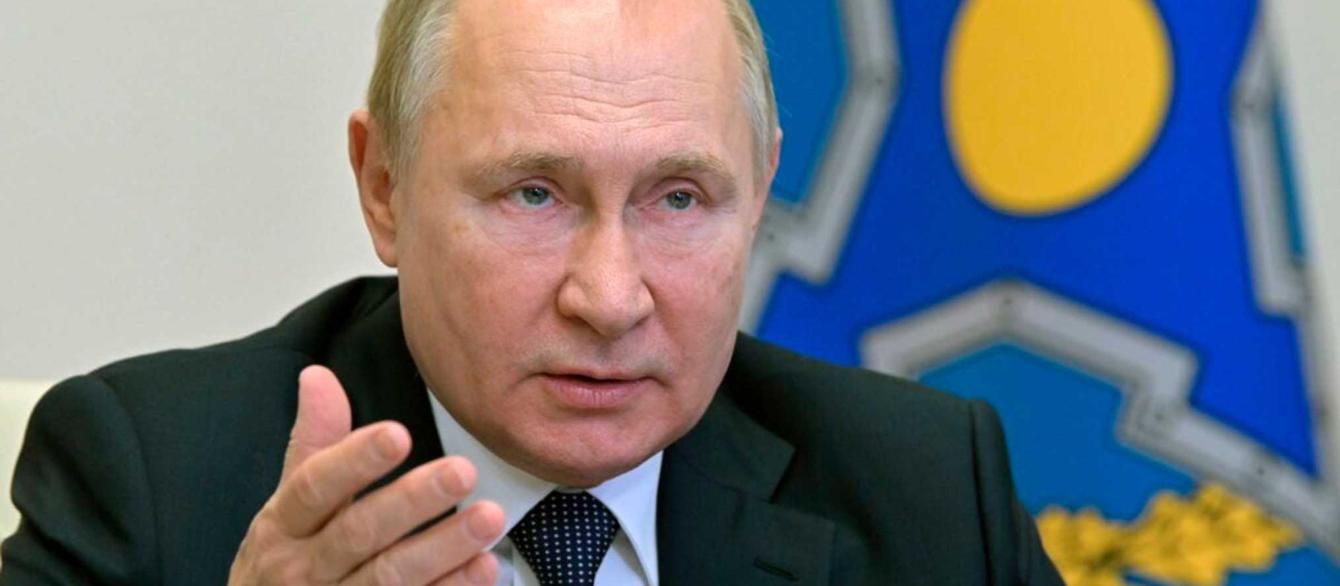Concerns over Russia’s intentions in Ukraine mounted after talks in Geneva between Russia and the U.S.-led NATO security alliance ended last week without success. Russia has amassed more than 100,000 troops and moved heavy weapons along its border with Ukraine in recent weeks and has begun positioning forces along the Belarus-Ukraine border. The Pentagon accused Moscow of deploying armed saboteurs into Eastern Ukraine to start violence as a pretext for moving its troops into the country, a tactic Russia used in 2014 during its invasion and occupation of the Crimean Peninsula. The Russians said they would withdraw if NATO agreed to a series of security measures, including permanently banning Ukraine from the Western military alliance, a proposal that has been flatly refused. Secretary of State Antony Blinken ’84 will meet with Russian foreign minister, Sergey Lavrov, Friday in an attempt to find a resolution to the standoff.
The Harvard Gazette spoke with Alexandra M. Vacroux, executive director of the Davis Center for Russian and Eurasian Studies and lecturer on government at Harvard, about why Russia appears to be readying for a military confrontation with Ukraine and what nonmilitary tools, if any, the U.S. and NATO have to prevent it. Interview has been edited for clarity and length.
Q&A with Alexandra M. Vacroux
GAZETTE: What is Russian President Vladimir Putin up to? Is Russia going to invade Ukraine and if so, why?
VACROUX: The Russians have been saying for a long time — and it’s the subject of a lot of academic debate — that the Americans and NATO promised there wasn’t going to be expansion to the east beyond the borders of the former East Germany at the end of the Cold War. The Russians have been fixated on this idea. When Russians talk about red lines, and “the Warsaw Pact was always there for a reason,” it assumes that countries themselves don’t get to choose what alliance they’re going to belong to, and it assumes that the U.S. was deliberately trying to keep Russia weakened and without its traditional buffer of countries.
So, the Russians see this is as unfinished business from the ’90s after the Soviet Union collapsed. The other thing is that Russia has felt like it’s encircled by hostile powers for 400, 500 years, 1,000 years. Whenever Russia wasn’t expanding it was being invaded by Turks and the French and the Swedes and the Mongols. So, they feel they need a belt of countries around them to protect them from marauders crossing the steppe. Those buffer countries include Georgia and Ukraine. That’s one of the justifications Russia gave to go to war with Georgia in 2008 — that Georgia was getting too close to the West and that was a red line. The U.S. and NATO’s position has always been that Russia doesn’t get to decide who joins an alliance. It’s the countries themselves that decide. And Russia doesn’t accept that.
The Russians gamble that they’re going to mass troops on the Russian border with Ukraine, which they’ve done once before [last year] and then they came to the table and said, “We have these draft treaties for NATO and the U.S., and this is what we want: We don’t want countries that are part of the former Soviet Union to join NATO, and we would like to have a discussion about how you’re going to pull back from our borders.” These draft treaties were complete nonstarters.
Last week the U.S. and NATO said, “There are some points here that we can talk about,” and the Russians said, “This is not a menu; this is a package. Take it or leave it.” NATO and the U.S. said, “Of course, we’re not going to take it.” I don’t know if it was obvious to the Russians that this was going to happen, or if they had convinced themselves that there is a way in which this show of force is going to produce different results than before. One of the reasons we don’t know that is because in an authoritarian regime like Putin’s, there’s a lot of group-speak, if not groupthink. Are there debates happening right now over in Moscow over whether the Russian version of the world order is something that can come into being? Or is it just that this is what they want, and they’ve convinced themselves that it’s necessary, it’s desirable, it’s possible, and therefore, we just have to apply the right degree of pressure? So that’s the first part of it.
The second thing is that we don’t know if the Russians are really going to invade Ukraine. They’ve got the equipment there. There’s a school of thought that says that the Russians think once they have a mass incursion into eastern Ukraine, the population of Ukraine is going to realize that President Volodymyr Zelensky has totally failed them and will topple his government. And then it’s not going to be an invasion because people are going to be glad that the Zelensky government has fallen. I have no idea if people are believing that. It seems completely fanciful and unrealistic. But it could be that the Kremlin has convinced themselves that Zelensky is incredibly unpopular, and it’s not going to take much to topple him.
Nobody really wants to get into exchanging cyberattacks because we don’t know how that story ends. It’s like an arms race without arms control.
GAZETTE: Since the Geneva negotiations ended, Putin has threatened a full break in diplomatic relations if the U.S. tries to further sanction Russia. Computers belonging to the Ukrainian government were hacked and infected with malware by Russia, according to Ukrainian officials. Broadly, what do these and other threats Russia has issued tell you about Putin’s intentions or state of mind?
VACROUX: Putin, in general, has a very aggressive style, so it doesn’t surprise me that he says, “If you don’t agree with what I want, I’m going to do this and this and this.” The arrest of the Russia-based REvil hacking group [that attacked several Western targets for ransom] was obviously something they could have done at any time. They’ve done it now just to say, “We can be helpful when we want to be. Watch this.” It’s part of the way the Russians are trying to make their position as strong as possible and show that they can threaten the West or the United States or NATO in a number of different ways. What we’re getting now is the list of the different ways in which they can be threatening.
The U.S. has said one of the ways that we would respond is by potentially banning Russia from the SWIFT financial payment system. That would be a big deal. That would basically make it very difficult for Russia to do any international transaction. That has potentially very serious ramifications in the short term. In the medium and long term, there would be alternatives to SWIFT that would be found, which is what Iran has done, and it’s probably not good for the U.S. if alternative systems run by the Chinese, for example, turned out to be functional as far as financial payments are concerned.
The Russians now have a pretty blasé attitude toward Western sanctions. There are two problems. Once they’re applied, you have to continually tighten sanctions for them to remain as effective because people find workarounds. The second problem is that sanctions approved by Congress can only be lifted by an act of Congress, which the Russians don’t expect to happen. The example the Russians use is the Jackson-Vanik amendment, which was put in place in 1974 because the Soviet Union wasn’t allowing Jews to emigrate. It was lifted only in 2012, decades after Jews were being allowed to emigrate. Once those sanctions are put in place, they’re basically locked in. There’s no incentive for Russia to try to do something to get them lifted because they’re almost impossible to lift.
Preventing Putin’s inner circle from traveling to the West may be awkward and embarrassing, but at this point, that threat is not going to stop him.
GAZETTE: What sanctions or punishment does Putin fear?
VACROUX: I don’t think he’s afraid of punishment. The sanctions for the past three or four years, at least, it’s been very clear to all the Russian oligarchs that they’re supposed to be coming back home. They’re supposed to be educating their kids in Russia, and they’re supposed to be leaving their assets in Russia. Now some of them have found ways to have real estate in Miami or whatever, but it’s definitely become less acceptable, for example, to have your kids going to college in the U.S. than it used to be. So there have been ways in which that inner circle has been squeezed, and it frankly doesn’t make a difference. Preventing Putin’s inner circle from traveling to the West may be awkward and embarrassing, but at this point, that threat is not going to stop him.
GAZETTE: Although President Zelensky has been lobbying to join NATO, Ukraine is not a member, and it doesn’t appear there was much support for it to join even before this incident. If Putin’s great fear is the further encroachment of NATO, is this aggression now pushing NATO to take up Ukraine’s defense?
VACROUX: That’s exactly what everyone is asking. They’re not now, and there’s very little prospect of them joining in the near future in part because of this territorial dispute in the east. No one is going to take a country with a territorial dispute with Russia into NATO. That’s the problem with Georgia, also. Because if Article V requires that you defend — no one is going to take anybody with a territorial dispute. It’s already obvious that Ukraine is not on the cusp of joining NATO by a long shot. So that brings us back to why is this happening now? One of the theories is that this is Putin seeing unfinished business he needs to take care of before he steps down or his term ends. I don’t love that because it’s so hypothetical and so skeptical. What is he going to gain by doing this? Especially since the Russians have made it clear — it’s not like they want Ukraine. That area of eastern Ukraine is an economic disaster. And if Ukraine is further split between pro-Russian and pro-Ukrainian, it means that they have less influence there than they did before, when they could convince the whole country sometimes to be more pro East. There’s something we don’t know about Putin’s calculation here because what we do know doesn’t make sense.
GAZETTE: What signs will you be looking for in the coming days to gauge whether an invasion will be averted or if tensions escalate even further?
VACROUX: A second round of talks, high-level talks. I think that’s essential — to keep the Russians at the table and to keep having a dialogue, even though it doesn’t seem to have been that productive right now. That can always change. Negotiations tend to have a long, frustrating period. In a way, that’s already giving something to Russia, because Russia is in the news; it’s on the world stage; Putin is talking with Biden. All of these things are extremely important to Putin. So, on the one hand, you could say that he’s getting some concessions because we’re coming to the table, but on the other hand, he’s not invading Ukraine. So that is very important. I would also keep an eye on the cyber situation. I would expect some kind of cyberattack by the Russians, perhaps demonstrating what they could do in Ukraine. It will be interesting to see if there’s any kind of Western response. Nobody really wants to get into exchanging cyberattacks because we don’t know how that story ends. It’s like an arms race without arms control. It gets really ugly. If you turn off power grids, people start dying in hospitals. It’s just a really bad way to go.
This article originally appeared in the Harvard Gazette on January 18, 2022.






